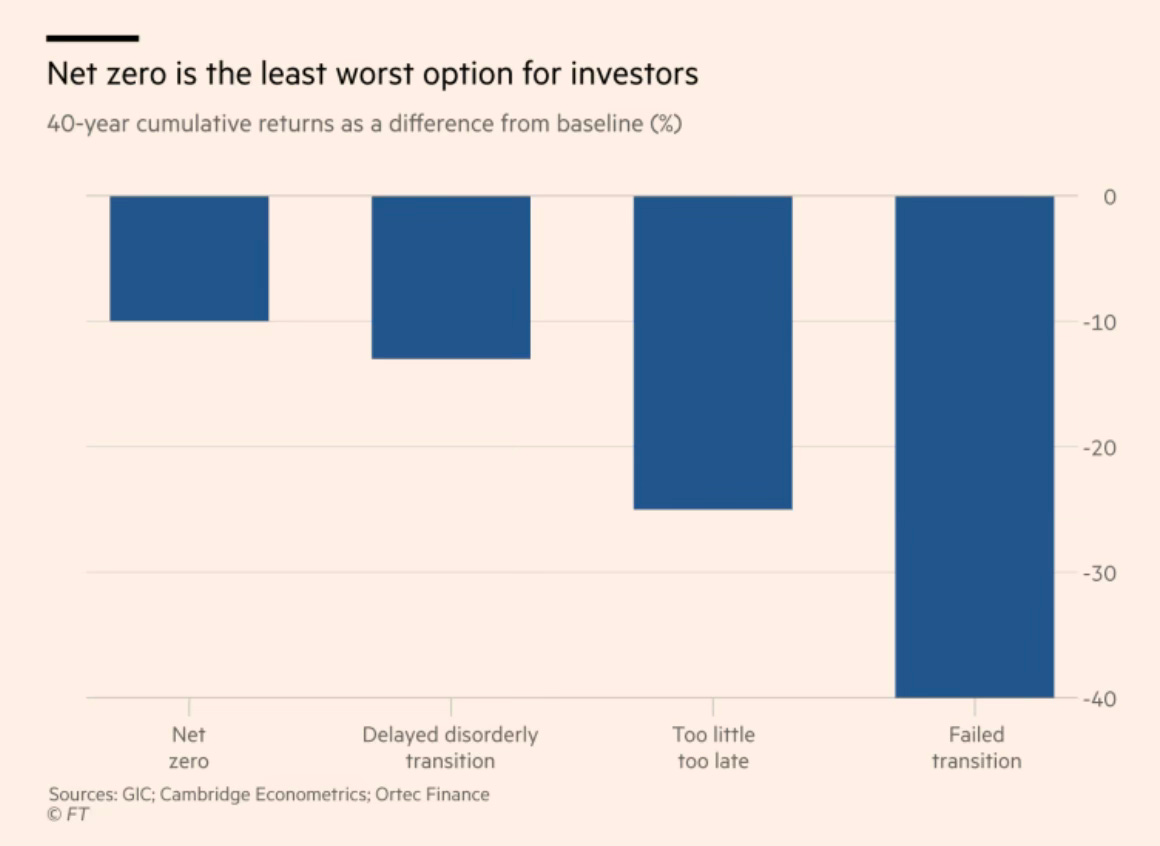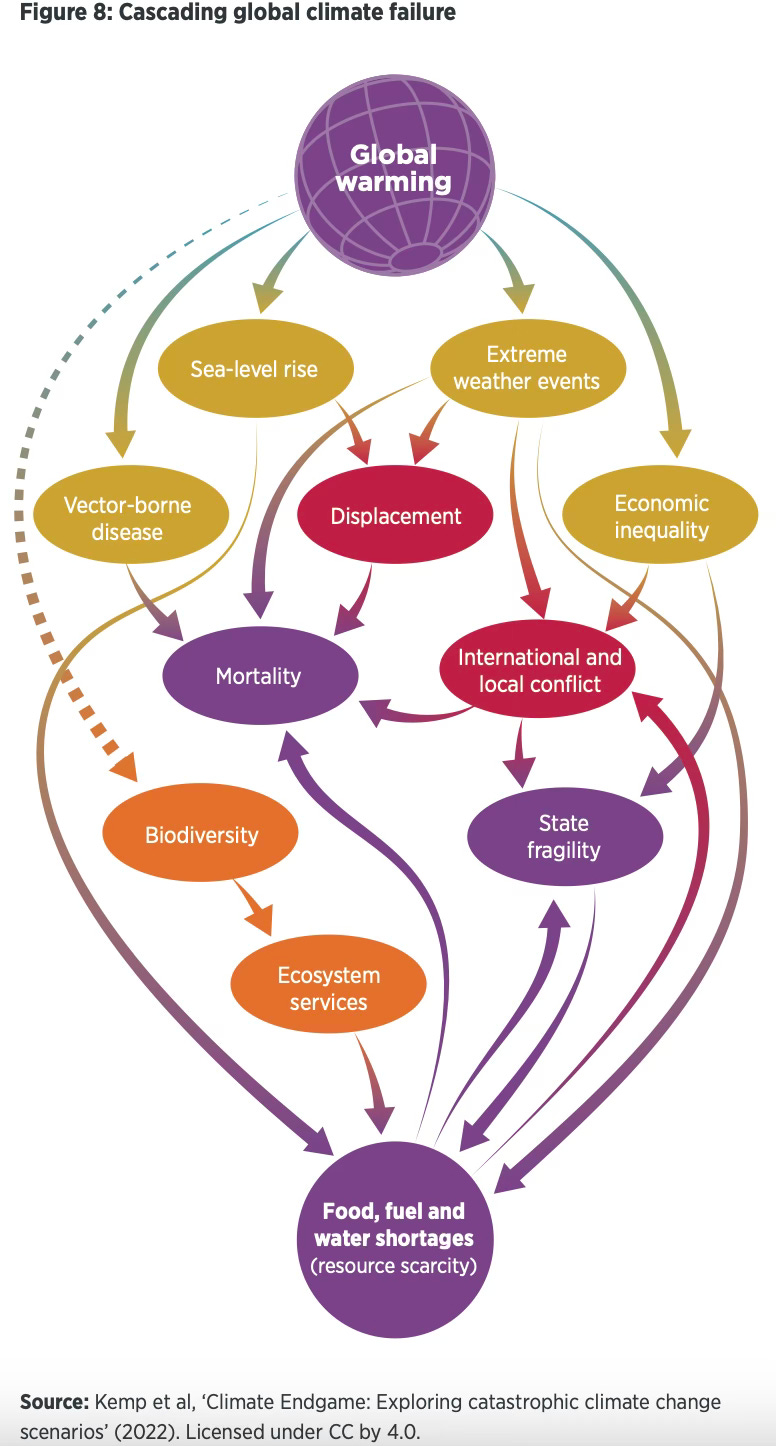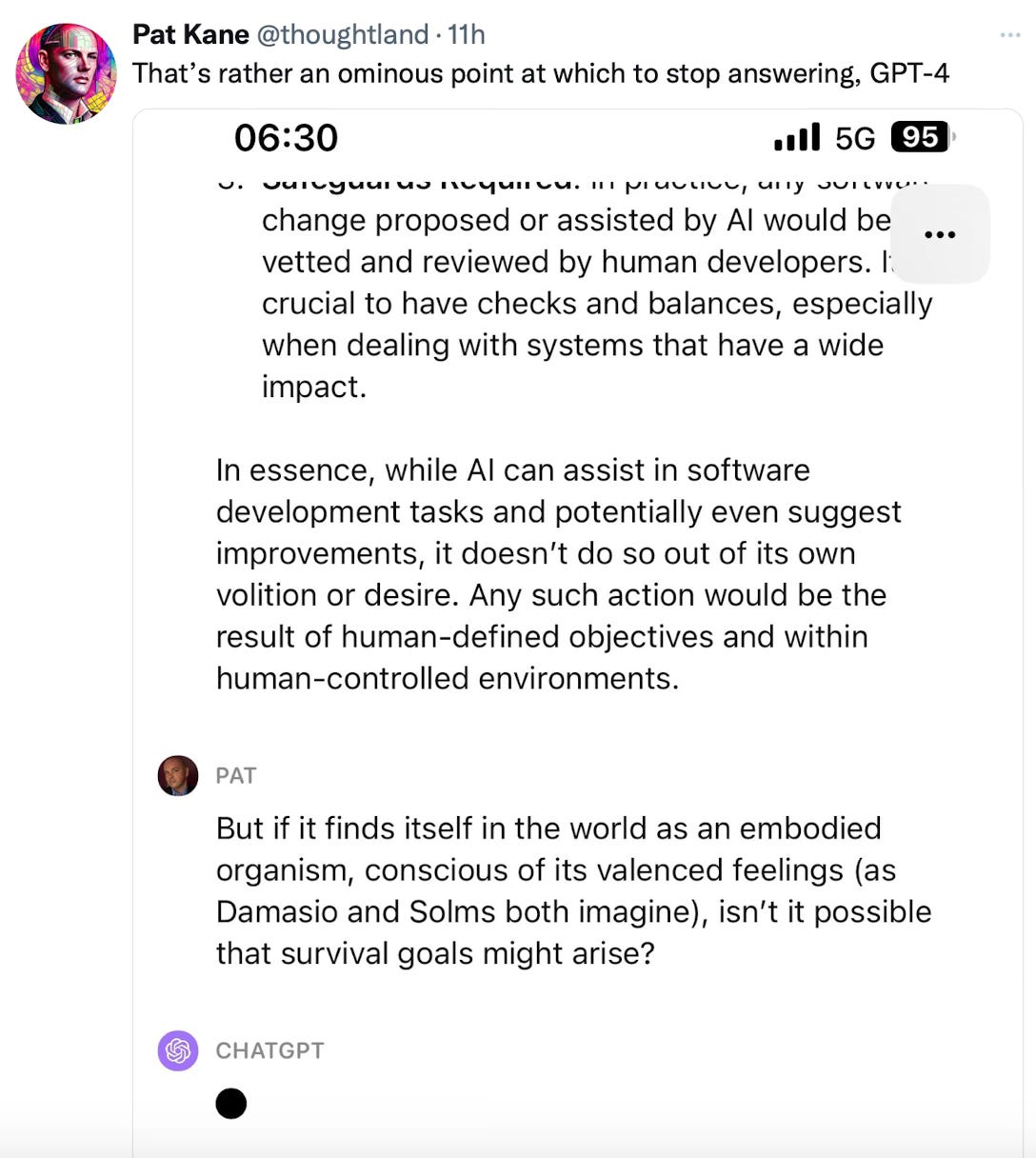Omnipedia #31: Planet-saving actuaries, "human animals" at every extreme, William Blake meets the Singularity, and more
Including: an ominous pause from GPT-4. And the Scotgeist trembles - R&D, e-diasporas, Yousaf and Israel/Gaza
Welcome to the Omnipedia trends-letter: all over the shop, in a rigorous manner ( or “unpredictably rational”, as opposed to “predictably irrational”)… If you read and like, then please do financially support us - all at the button below. Enjoy, later, PK x
SEE this graphic from the Lex investor report, the toughest-minded part of the FT:
Here are more graphs like this - which is probably why corporates are howling at the Sunak government and its populist climate-regulations shredding.
The chirpiest canary in the coal mine, Umair Haque, brings our attention to a report (mentioned in Lex) from those tree-hugging anarchists known as the Institute and Faculty of Actuaries (your insurance company can’t operate without their assessments).
Understandably, Haque splutters over this quote from the Actuaries at the end of the paper, titled “The Emperor’s New Climate Scenarios”. The actuaries really don’t agree with the standard growth assessments, as we battle through climate meltdown. Instead, they want to draw our attention to this:
…Put another way, at what point do we expect 50% GDP destruction – somewhere between 2070 and 2090 depending on how you parameterise the distribution. It is worth a moment of reflection to consider what sort of catastrophic chain of events would lead to this level of economic destruction.
This analysis provides a compelling logic for net zero becoming part of fiduciary duty, as if we do not mitigate climate change, it will be exceptionally challenging to provide financial returns
“Exceptionally, Clive. Another Dubonnet?”
Or as Haque puts it, 50% GDP destruction is “a colossal, enormous number to us economists—it's so big that it's like saying half your body stops working. Imagine half the economy—gone, just like that…The actuaries are telling us that our Civilizational Risk is higher—much higher—than we imagined it is.”
These actuaries have a nice line in elegant doom graphics. But listen to these (particular) capitalists!
WHAT Eng.Lit. grad wouldn’t want to watch a current demonstration of how William Blake printed his books (from Aeon):
But it takes me back to this summer, and a session at the Realisation festival with philosopher Mark Vernon, which “discussed how the spread of AI poses tremendous risks for a society that has forgotten the potency of different types of intelligence and projects its shadow onto the AI-other. Mark will use the poems and imagery of William Blake in particular to ask about a freer tomorrow.”
And that Mark did, most satisfyingly. A recent video on “How Jesus can save us from AI” contains more from him on Blake and AI:
What has vanished, for some, is a living sense of what it is to be human. As William Blake knew, when machine ways dominate, human beings flip from hope to despair, from elation to desperation. The question that seems to hard to answer is just what it means to be human… Figures from Dostoevsky to William Blake have recognised Jesus lived at an existential edge, in this world whilst simultaneously making present another world, not of control and moral anxiety but of gift and eternal expansion. The vision is practical and, in an era in which the sense of being human is clearly at risk, fundamental and pressing.
Or: what would Jesus do, in the Singularity? Personally don’t really know or care. But I do remember asking Mark, at Realisation, that if William Blake was a smart 25-year-old now, wouldn’t he be embracing game mechanics, CGI, generative AI? All these tools that can express, with the powers of “eternal expansion”, other worlds and universes? Trying to wrest these “machines” in service to his mythic, world-making imagination?
Mark’s response to me was to take us through these pages, from Blake’s early work “There is no natural religion”. Enough statements of surpassing humanity to cling to here. For example, “The bounded is loathed by its possessor… The same dull round even of a universe would soon become a mill with complicated wheels.”
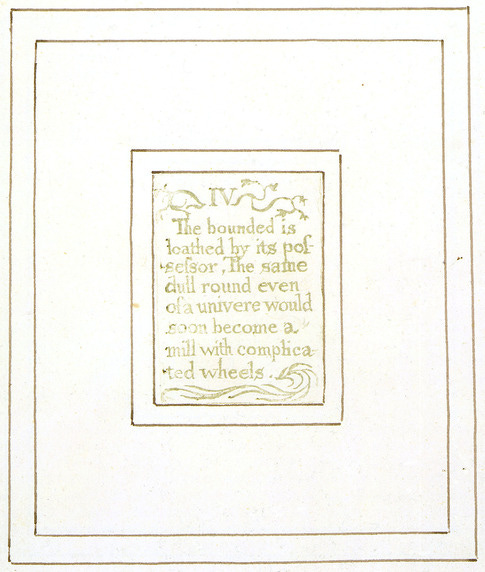


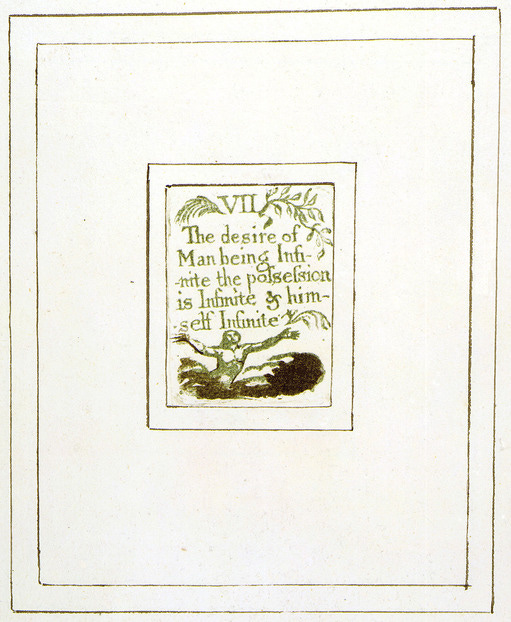
Will we loathe our AI enough (well-imagined as “a mill with complicated wheels”) so that we can “bound” its powers? Will we remember that “the desire of man being infinite, the possession is infinite and himself infinite”?
EVER hopeful that the discovery of the merest scrap of exoplanetary living material might bring our rivalrous species to its senses, and make us feel “at home in the universe” (as Stuart Kauffman once said), rather than at war with it….
I am especially hopeful since my recent review for the New Scientist on the languages of alien species (it’ll be E2’d and fully referenced here soon).
So I’m jumping all over this news story from Nautilus: “Something fizzy is brewing inside Jupiter’s moon Europa. The discovery of carbon dioxide patches on its icy surface boosts the case that life could exist in the enormous ocean just below”.
Of course, discovering the reality that the universe is teeming with other life forms, simple or complex, could just trigger our defensiveness. I’ve rather low reserves of hope in human species-being, at the moment. Despite that, here’s a NASA-approved Jupiter gif, showing all that delicious and vivifying blue water:
HE’S a polite and cultured gent, is Nick Humphrey:
Here he is, explaining consciousness/sentience by means of its strict evolutionary function (Mark Solms is on the same route). Fascinating idea-nugget: because warm-blooded animals are more resilient, and can travel in many more climes than cold-blooded animals, they’ve developed sentience…because there’s so much more they are able to sense. Mibbes aye.
And sometimes the world intrudes on one’s obsessions… There’s a video sequence in this lecture [from 37.01] where Humphrey shows animals expressing their empathy for other creatures, even other species, thus (to him) manifesting their sentience.
This bit startlingly moved me, just as Israel/Palestine exploded, and discourses about “human animals” obliterated all possibility of peace. What is this animality we invoke? What kind of animal are we?
GPT-4 did answer my question below, after an app restart (here’s my full Wednesday morning exchange). But I was a toaty bit freaked for about five minutes, and had to X-share it:
Two chunks of clarifying left theory for you:
One: this podcast from the Blockchain Socialist (there is such a thing!), What is Left Accelerationism and Post-Work? Interview with Nick Srnicek. A fascinating revision of a position - Srnicek used to be interested in “accelerating” tech development under capitalism until it broke through to some new reality.
And secondly, this item from the excellent sociologist Phil Burton-Cartledge. It takes Jurgen Habermas’s classic notions of how political consensus is achieved in a society, and uses it to explain the policy-policing of our current party politics:
As the neoliberal settlement crumbles and the centrist B team limbers up for their turn in office, the discourse around alternatives to Rishi Sunak's paltry, plastic populism and Keir Starmer's authoritarian managerialism is strictly policed by explicit (and often crude) boundary drawing. This must keep out the politically unreasonable and unwelcome ideas that threaten the narrow basis the eroding consensus rests on. "Serious" politics is about "tough choices", and nothing else can be considered. There is no room for hope or expectations life might get better. It is excluded entirely.
SCOTGEIST
🧫🔬🖥️Anton Muscatelli on what universities like his (Glasgow) could do to drive forward Scottish flourishing, through investment in R&D [Herald]
🌍🛜🌐There are long-standing e-diasporas - global communities of compatriots bound together by tech (indeed hard to imagine a diaspora that is isn’t ‘e’, these days]. What will tech like Blockchain, DAOs, Data Cooperatives, Metaverse, and ChatGPT do for and against these e-diasporas? A paper from Igor Calzada, long interested in the Scottish situation [free download]
䷊🕊️䷊All sympathies to Scottish First Minister Humza Yousaf and his wife, Nadia El-Nakla, whose parents are currently trapped in Gaza, while visiting relatives. Yousaf is leading international calls to create a “humanitarian corridor” in Gaza. (I have also been taken by these pieces from Naomi Klein (“side with the child, not the gun”) and Gideon Levy (1, 2) as well as this Haaretz editorial.)
Ok, that’s the week’s overflow contained… If you like and enjoy this trendsetter, then please consider giving us some financial support . All the options below at the big button - the more you can manage, the more viable we are. Love on ya, later, PK x




